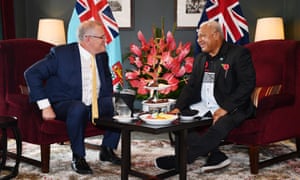Extract from The Guardian
The prime minister tells Pacific leaders Australia will reach net zero emissions ‘as soon as possible’, but declines to commit to a timeline
Australia has officially abandoned its plan to use Kyoto protocol carryover credits to meet its Paris agreement climate targets, the prime minister, Scott Morrison, has told a Pacific leaders’ summit, but he pointedly declined to commit to a timeline on reaching net zero emissions.
As Pacific leaders said their islands and homes would not be the “sacrificial canaries” in the coalmine of climate change’s existential threat, Morrison said late on Friday that Australia would reach net zero “as soon as possible”.
“Ambition is of course ambition, and we share it, but it’s only action and results that change outcomes for the world.”
Morrison said Australia had surpassed its targets. “The overachievement didn’t happen by accident, it came through very hard work and cost and sacrifice,” the Liberal leader said.
“We’re committed to achieving net zero emissions as soon as possible. Our long-term emissions reduction strategy, to be lodged ahead of GOP26, will provide the necessary detail on our plan, but much has already been released.”
Morrison said he was “very confident” Australia would not need to draw on its Kyoto protocol carryover credits – “that Australians earned” – to meet its 2030 Paris agreement targets.
But Australia has not updated its Paris targets – as other countries have – since they were made five years ago.
Other Pacific leaders at the forum were far more forthright, urging countries to phase out fossil fuels, and abandon their subsidies, while rapidly decarbonising.
Fiji’s prime minister, Frank Bainimarama, told the Pacific climate change roundtable on Friday night that five years on from the Paris talks the world was still warming rapidly, and he refused to let Pacific Island nations be the “sacrificial canary for coal-burning countries”.
“If high-polluting countries do not curtail their greenhouse gas emissions and commit to meaningful net zero targets, we are well on track to reach 1.5C [warming] by 2030, 2C by 2050 and up to 5C by 2100,” said Bainimarama, an outspoken climate advocate for the Pacific.
And he rejected the analogy, sometimes offered, of the Pacific as a “canary in the coalmine” on climate, the first affected as a warning to others. In the analogy, Bainimarama pointed out, the canary dies.
“I refuse to let Fijians and our Pacific Island sisters and brothers be some sacrificial canary for coal-burning countries and high-emitting companies,” he said.
“We must not stand idly by and watch the world’s most vulnerable countries suffer, only to warn other, wealthier nations that their own fate will soon follow. This is not just Fiji’s climate emergency – it is the world’s emergency. The high-emission countries simply have to face facts. We all depend on each other. Climate complacency by one will harm all others.”
Bainimarama’s comments will be seen as being aimed at Canberra given Australia is conspicuous as a Pacific Islands Forum nation that has not committed to a net zero emissions target.
At last year’s forum, after a heated and protracted leaders’ meeting, Bainimarama described Morrison as “very insulting and condescending” and unwilling to negotiate during climate talks.
“I thought Morrison was a good friend of mine,” Bainimarama said, “apparently not.”
Australia is the largest and most influential of the Pacific Islands Forum countries, seen as a leader in development assistance and, particularly, in its regional Covid-19 response efforts.
But a schism between Australia and island nations over climate change action – with island leaders consistently disappointed by Canberra’s lack of ambition on emissions reduction – has undermined Australia’s influence and established a faultline in Pacific relations.
The Samoan prime minister, Tuilaepa Aiono Sailele Malielegaoi, urged all Pacific countries to phase out fossil fuels and to act collectively “as one Blue Pacific continent” in “bold, decisive and transformative action” on climate.
The New Zealand PM, Jacinda Ardern, said climate change was “not a hypothetical for the Pacific … [but] the greatest threat facing our region”. “Our region cannot wait,” she said.
Australia has notably been refused a speaking slot at Saturday’s global climate summit because its declared climate targets are not seen as sufficiently ambitious.
Richie Merzian, the climate and energy program director at the Australia Institute, said Australia was isolated at the Pacific meeting, surrounded by countries that had made significant commitments to cut emissions to zero by the middle of the century.
“The prime minister continues to use the term ‘Pacific family’ to describe his relationship to the region, but the term appears to be as shallow as Australia’s climate credibility. There is no stepping up relations in the Pacific without stepping up on climate action.”
Paul Ronalds, the chief executive of Save the Children Australia, said Pacific communities were “living on the frontline of the climate emergency, trying to combat extreme weather events of increasing frequency and intensity”.
“Australia must do its part to respond to the domestic, regional and global impacts of climate change for this generation and the next,” he said.

No comments:
Post a Comment